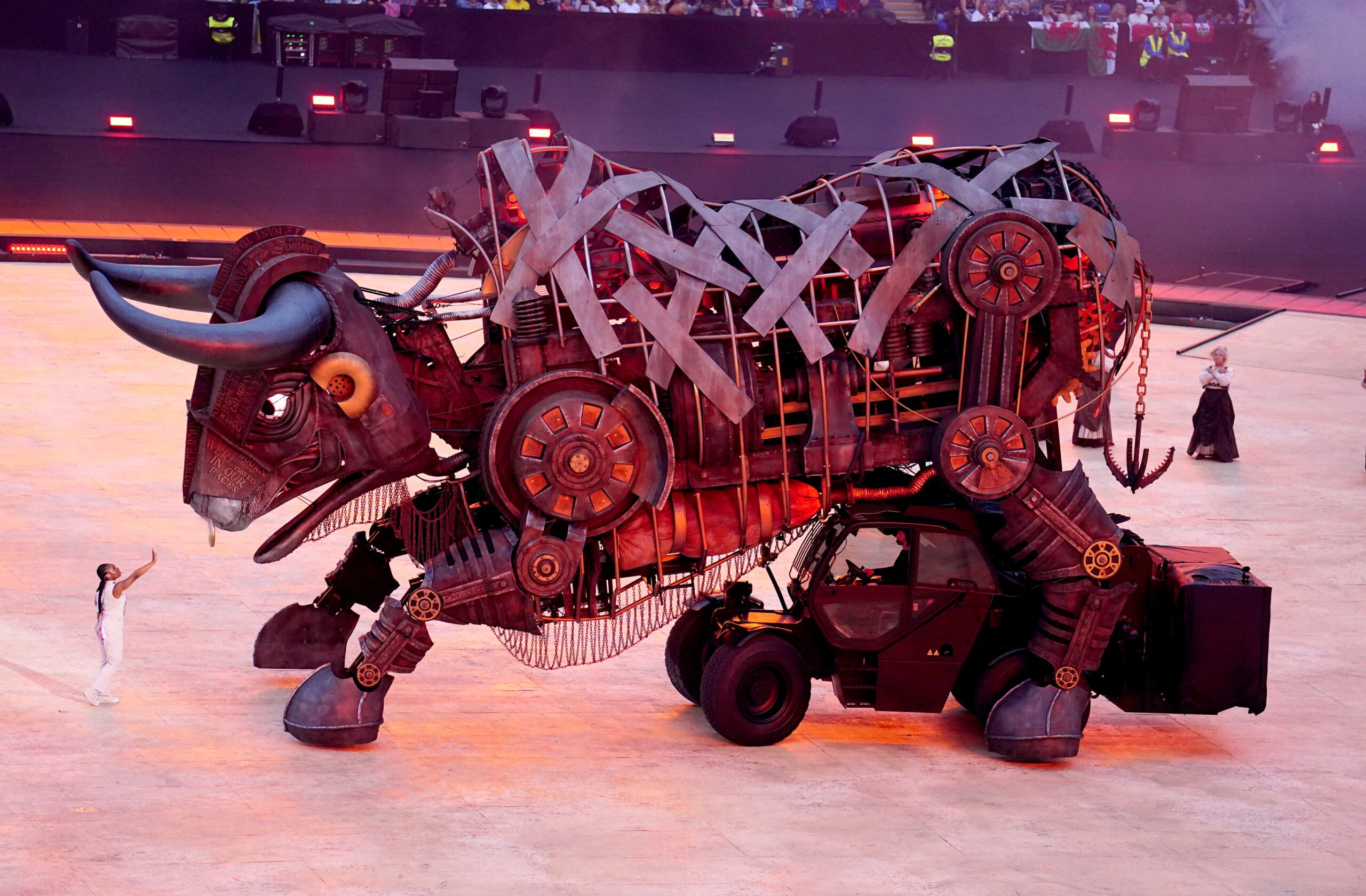

To borrow an oft-quoted phrase, reports of the death of the Commonwealth Games have long been greatly exaggerated.
The chorus of cynics fire their shots with the unerring accuracy of a boxer’s uppercut, nag away for few days and then, by the time everything is done, it’s “see you in four years”.
Because here these Games are again, 22 editions in and still punching above their weight in a crowded sporting calendar. Birmingham’s quirky first-night show won’t have done any harm in that scrap.
However, this alliance of nations, forged by the pink bits of a long-yellowing world order, has probably never been more precarious. For too many years they’ve been held together by one woman, now 96, and this sports event. Which seems, it must be said, more than just a little fragile.
Birmingham’s opening night didn’t shy away from the challenges of what can sometimes seem an uneasy alliance, in a clever, vibrant and colourful show described as a “love letter” to the West Midlands.
Because when it comes to inclusivity and diversity, these far-flung and distant cousins, covering about one-third of the world’s population, are more than just oceans apart.
Emily Campbell and Jack Laugher led England into Alexander Stadium
(PA)
There’s a lot of talk about democracy, climate change, tolerance and inequality but there also seems a stubborn refusal from many of its members to do anything substantial about it.
Four years ago in the Gold Coast diving gold medallist Tom Daley used his platform to strongly condemn anti-gay laws in 37 Commonwealth countries.
Since then that number has become 35 – painfully inadequate progress – just under half of the nations and territories competing marching tonight at the Alexander Stadium.
Daley – who would face the death sentence for how he chooses to live his life in one of the competing nations here – carried the Queen’s Baton into the stadium surrounded by rainbow pride flags and joined by runners from Commonwealth nations where homosexuality is banned.
Tom Daley carried the Queen’s Baton into the stadium
(AFP/Getty)
Symbolism often weighs heavy in these ceremonies but the message here resounded loud, as local hero Denise Lewis handed the baton to Prince Charles to formally open the Games.
“We are one family,” insisted Commonwealth Games Federation president Dame Louise Martin.
“Our 72 nations, we all speak the same languages. We’re all in this together. If you go into the village and see the athletes together, it’s family, that’s how we speak and how we see each other.
“I find it strange. Some people talk about colonialism, all the different breakdowns. Yes, people want independence but people still want to be a part of the Commonwealth Games.
“We’re unique because we’re holding everyone together.”
In the same way JFK set the bar improbably high for presidential inaugurations, it’s 10 years since Danny Boyle did much the same for opening ceremonies.
Prince Charles drove himself into the stadium in a vintage car
(Reuters)
However, this show still had plenty of moments to remember – Prince Charles didn’t jump from a helicopter, instead preferring to drive himself into the stadium, as 72 vintage cars, a nod to Birmingham’s heritage for car manufacturing, formed a union flag.
Black Sabbath’s Tony Iommi did his thing, Duran Duran played some 80s bangers and education activist Malala, an adopted Brummie, spoke with passion about creating a Commonwealth of opportunities.
But the highlight was a 10m-high mechanical raging bull, the symbol of this city, that billowed smoke into the night sky as 30,000 collectively cheered along.
Birmingham has been dreaming of a moment like this for nearly four decades, when they bid for the Olympics but lost out to Barcelona, the blazers of the International Olympic Committee rather short-sightedly deciding their Bullring shopping centre was not as good as the actual bullring in the Catalan capital.
The raging bull was the centrepiece of the opening ceremony
(PA)
They only stepped in to stage these Games when South Africa’s Durban pulled out because of cost concerns. It may be the “second city” but too often it’s been seen as worse than second best, a place you drove through to get to London, with all its self-assured cocky capital confidence, or Manchester, with its brooding “mad for it” swagger and sass.
But here in Britain’s youngest and most ethnically and culturally diverse city, they’ve heard all the jokes before, which is probably why it’s home to comedians from Jasper Carrott to Frank Skinner.
Did you hear about the Brummie who fought in Vietnam and kept getting flashbacks to being in Birmingham?
But this will be 12 days when everyone will look enviously at Birmingham – the cradle of the industrial revolution, a home of scientific endeavour, the birthplace of the balti, where oxygen was discovered and the Football League was founded.
There was a point when three-quarters of all pens in the world had nibs made in Birmingham, so now seems an appropriate point to quill some new history.
A city that famously boasts it doesn’t boast, might just have something to crow about in the days ahead… the one-time workshop of the world now welcoming it.
National Lottery players raise more than £30m a week for good causes including vital funding into sport – from grassroots to elite. Find out how your numbers make amazing happen at: www.lotterygoodcauses.org.uk and get involved by using the hashtag: #TNLAthletes.

